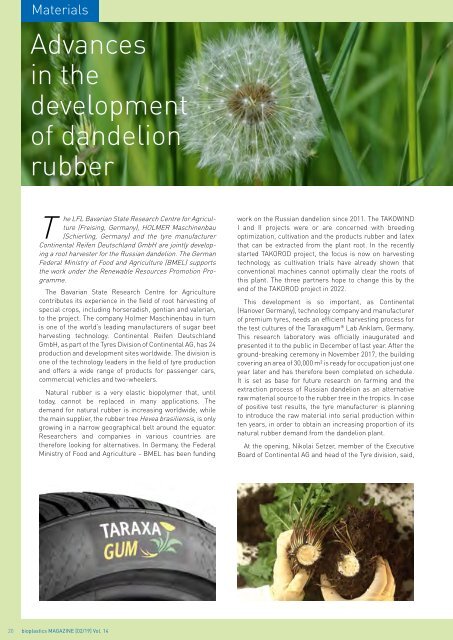Issue 02/2019
Highlights: Thermoforming Building & Construction Basics: Biobased Packaging
Highlights:
Thermoforming
Building & Construction
Basics: Biobased Packaging
Create successful ePaper yourself
Turn your PDF publications into a flip-book with our unique Google optimized e-Paper software.
Materials<br />
Advances<br />
in the<br />
development<br />
of dandelion<br />
rubber<br />
T<br />
he LFL Bavarian State Research Centre for Agriculture<br />
(Freising, Germany), HOLMER Maschinenbau<br />
(Schierling, Germany) and the tyre manufacturer<br />
Continental Reifen Deutschland GmbH are jointly developing<br />
a root harvester for the Russian dandelion. The German<br />
Federal Ministry of Food and Agriculture (BMEL) supports<br />
the work under the Renewable Resources Promotion Programme.<br />
The Bavarian State Research Centre for Agriculture<br />
contributes its experience in the field of root harvesting of<br />
special crops, including horseradish, gentian and valerian,<br />
to the project. The company Holmer Maschinenbau in turn<br />
is one of the world’s leading manufacturers of sugar beet<br />
harvesting technology. Continental Reifen Deutschland<br />
GmbH, as part of the Tyres Division of Continental AG, has 24<br />
production and development sites worldwide. The division is<br />
one of the technology leaders in the field of tyre production<br />
and offers a wide range of products for passenger cars,<br />
commercial vehicles and two-wheelers.<br />
Natural rubber is a very elastic biopolymer that, until<br />
today, cannot be replaced in many applications. The<br />
demand for natural rubber is increasing worldwide, while<br />
the main supplier, the rubber tree Hevea brasiliensis, is only<br />
growing in a narrow geographical belt around the equator.<br />
Researchers and companies in various countries are<br />
therefore looking for alternatives. In Germany, the Federal<br />
Ministry of Food and Agriculture - BMEL has been funding<br />
work on the Russian dandelion since 2011. The TAKOWIND<br />
I and II projects were or are concerned with breeding<br />
optimization, cultivation and the products rubber and latex<br />
that can be extracted from the plant root. In the recently<br />
started TAKOROD project, the focus is now on harvesting<br />
technology, as cultivation trials have already shown that<br />
conventional machines cannot optimally clear the roots of<br />
this plant. The three partners hope to change this by the<br />
end of the TAKOROD project in 2<strong>02</strong>2.<br />
This development is so important, as Continental<br />
(Hanover Germany), technology company and manufacturer<br />
of premium tyres, needs an efficient harvesting process for<br />
the test cultures of the Taraxagum ® Lab Anklam, Germany.<br />
This research laboratory was officially inaugurated and<br />
presented it to the public in December of last year. After the<br />
ground-breaking ceremony in November 2017, the building<br />
covering an area of 30,000 m² is ready for occupation just one<br />
year later and has therefore been completed on schedule.<br />
It is set as base for future research on farming and the<br />
extraction process of Russian dandelion as an alternative<br />
raw material source to the rubber tree in the tropics. In case<br />
of positive test results, the tyre manufacturer is planning<br />
to introduce the raw material into serial production within<br />
ten years, in order to obtain an increasing proportion of its<br />
natural rubber demand from the dandelion plant.<br />
At the opening, Nikolai Setzer, member of the Executive<br />
Board of Continental AG and head of the Tyre division, said,<br />
20 bioplastics MAGAZINE [<strong>02</strong>/19] Vol. 14


















